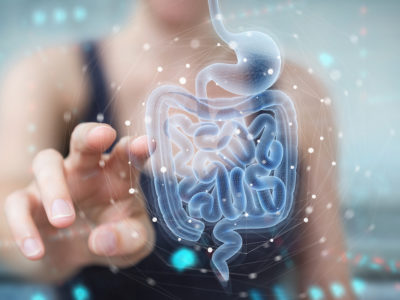Table of Contents[Hide][Show]
If you’ve decided to start taking probiotics, congratulations! They can play a crucial role in rebalancing your gut microbiome and getting your health on track.
However, there’s no “green light” in your body to let you know with absolute certainty that they’re working.
Unlike taking insulin and measuring your blood sugar, you won’t necessarily have proof that your probiotics are taking effect. Instead, you’ll have to monitor your body for more subtle signs of improvement.
Let’s look at some of those signs, so you can answer the burning question: “How do I know if my probiotic is working?”
What Is a Probiotic?
Let’s start by taking a minute to understand what probiotics are.
Your body is teeming with millions of bacteria. They’re on your skin, in your mouth, and in your gut. Feeling a little grossed out? Don’t be! Many of these bacteria are actually good for you.
Your body hosts both “good” (beneficial) and “bad” (pathogenic) bacteria. The trick is to have the right balance.
Your gut microbiome, where most of your body’s bacteria is found, has a limited amount of space. When your bad bacteria flourishes, it can crowd out the beneficial bacteria, leading to a long list of health issues.
Probiotics boost the quantity and quality of beneficial bacteria. They help create thriving colonies of “good guys” and restore the right balance to your gut microbiome.
How to Take Probiotics
There are a couple of ways you can consume probiotics.
For most people, probably the easiest way to boost good bacteria is to consume probiotic-rich foods and drinks. These delicious foods can be eaten alone, as snacks, or with your meals. You may already be eating them and not even realize it!
Some probiotic-rich food options include:
- Kefir
- Kimchi
- Kombucha
- Miso
- Pickles
- Sauerkraut
- Soft cheeses (only some)
- Sourdough bread
- Tempeh
- Yogurt
You may have noticed from this list that most, if not all, probiotic foods and drinks have gone through the fermentation process. This gives them a very distinct odor and flavor that may not appeal to everyone. And, some people might have food allergies or dietary restrictions.
If that’s the case, you can also choose to take probiotics as a supplement.
Probiotic supplements come in several forms, including:
- Capsules
- Liquid
- Pills
- Powder
As with any supplement, it’s important to read labels and check expiration dates. Also, some strains of probiotics are more fragile than others. Be sure to follow storage instructions (some may even need to be refrigerated) to make sure that they maintain their effectiveness.
And always make sure you purchase your probiotics from a trusted source. Just Thrive Probiotic is clinically proven to be effective thanks to an outer “shell” that protects them from bile and enzymes in your digestive tract. They arrive in your gut 100% intact and ready to work!
7 Signs Probiotics Are Working
Once you start taking probiotics, chances are you’ll be impatient to see results—and fast.
Here are some ways you can gauge if your probiotics are working for you.
1. More Regular Bowel Movements
Digestive issues are one of the top symptoms associated with a gut imbalance. For some people, this shows as constipation. For others, it’s diarrhea.
When you start taking probiotics and increase the good gut bacteria, those digestive issues will slowly begin to resolve themselves.
One tell-tale sign that your probiotics are working, then, is having more regular bowel movements.
2. Less Bloating
Another digestive issue associated with a bacterial imbalance is having a bloated belly.
Your gut bacteria produce the enzymes that your body uses to break down certain nutrients, including fiber. If they aren’t broken down, your body simply can’t digest them properly. One of the byproducts of this ineffective digestion is excess gas.
The excess gas in your belly will cause more frequent bloating, stomach cramps, and flatulence. If you’ve been experiencing these uncomfortable symptoms fairly regularly, you’ll likely notice them declining and eventually disappearing altogether when your probiotics start working.
Related
Digestive Enzymes vs. Probiotics… What’s The Diff?
Probiotics and enzymes are being talked about non-stop in the health community and this might be a silly question, but… what’s the diff? See significant improvements on your health when you feed your body with the best probiotic and enzymes.
3. Reduced Cravings
One of the many jobs of the beneficial bacteria in your gut is to control your blood sugar levels. It accomplishes this by helping break down the carbohydrates you consume and regulating their release into your bloodstream.
When the bad gut bacteria outnumber the good, your blood sugar levels will be all over the place, spiking and then crashing. This, in turn, leads to cravings for sugary snacks throughout the day.
If you notice that your sugar cravings are subsiding, it’s a good sign that your probiotics are working as well as they should be.
4. Better, Deeper Sleep
Your gut and your brain interact all day long. A perfect example of this is “butterflies” in your stomach when you’re nervous—your brain is affecting your gut.
Similarly, having digestive issues can cause anxiety when you’re in public—here, your gut is affecting your brain. This connection is known as the gut-brain axis.
But there are other, less obvious, ways in which your gut and your brain interact.
Believe it or not, your gut health can also impact your sleep patterns. So, boosting your gut health will help improve your slumber, too.
The changes to your sleep pattern may be so slight that it’s almost imperceptible when you’re asleep. But you’ll know your probiotics are working when you wake up in the morning full of energy and ready to tackle a new day! So, make sure to check in on those energy levels after beginning your probiotic regimen.
5. Improved Mood
An improved mood is, perhaps, one of the most subtle signs probiotics are working for you. But remember the gut-brain axis we discussed earlier? It also affects your mood.
- Studies have shown that participants taking probiotics have improved moods and stay calmer.
- Also, as we noted above, probiotics can help you sleep better at night. The increased rest will also contribute to being in a better mood.
- Finally, digestive issues are linked to mental health as well. Improving your digestive health can result in reduced anxiety and depression.
6. Stronger Immune System
Not sure of how your immune system is connected to your gut bacteria? Try this on for size: over 70% of your immune system is housed in your gut!
When your gut bacteria are balanced and the beneficial “bugs” are thriving, your immune system will be stronger. A healthy gut microbiome boosts your immune cells and reduces inflammation.
While you may not notice any immediate signs, you’ll be less susceptible to colds, minor infections, and so forth.
7. Increased Energy
One of the many jobs of a healthy gut is to help your body absorb the nutrients in your food. If your beneficial bacteria is being crowded out by the bad bacteria, this won’t happen as efficiently.
When probiotics boost your beneficial bacteria, however, the vitamins and minerals in your food are absorbed more easily. This can lead to increased energy and reduced fogginess when those nutrients kick in, because your body is now absorbing a larger amount of what you’re consuming.
Related
10 Best Herbs for Energy and Vitality
Feeling more lethargic than usual? These ten herbs for energy and vitality will help you cope with stress better, beat fatigue, and get sleep.
How Quickly Do Probiotics Work?
Probiotics aren’t a “quick fix.” After all, it takes time to reach a bacterial imbalance, and it’ll take time to overcome it.
And, like more traditional pharmaceuticals, there are factors that will affect how quickly they take effect.
Some of these factors are related to which probiotic you choose:
- Probiotic strain
- Dose
- Product quality
Other determining factors will be unique to each individual:
- Diet
- Exercise habits/ lifestyle
- Body weight
- The state of your gut microbiome
How quickly you see results will also depend on which symptoms you’re experiencing. Some symptoms, especially digestive issues such as diarrhea or bloating, may go away in as little as a few days. More chronic conditions, however, may take several weeks before you see improvements.
Final Thoughts
It might take a while to understand whether your probiotics are working or not.
One thing we do recommend is keeping a journal of symptoms. It’s easy to forget how you felt on a specific day and difficult to discern patterns without a record. But when you start tracking how your mind and body feel, you’ll be able to notice even the smallest changes.
If you take the time to really tune in to what your body is telling you, you’ll be able to pick out some subtle signs probiotics are working for you.
You May Also Like…






